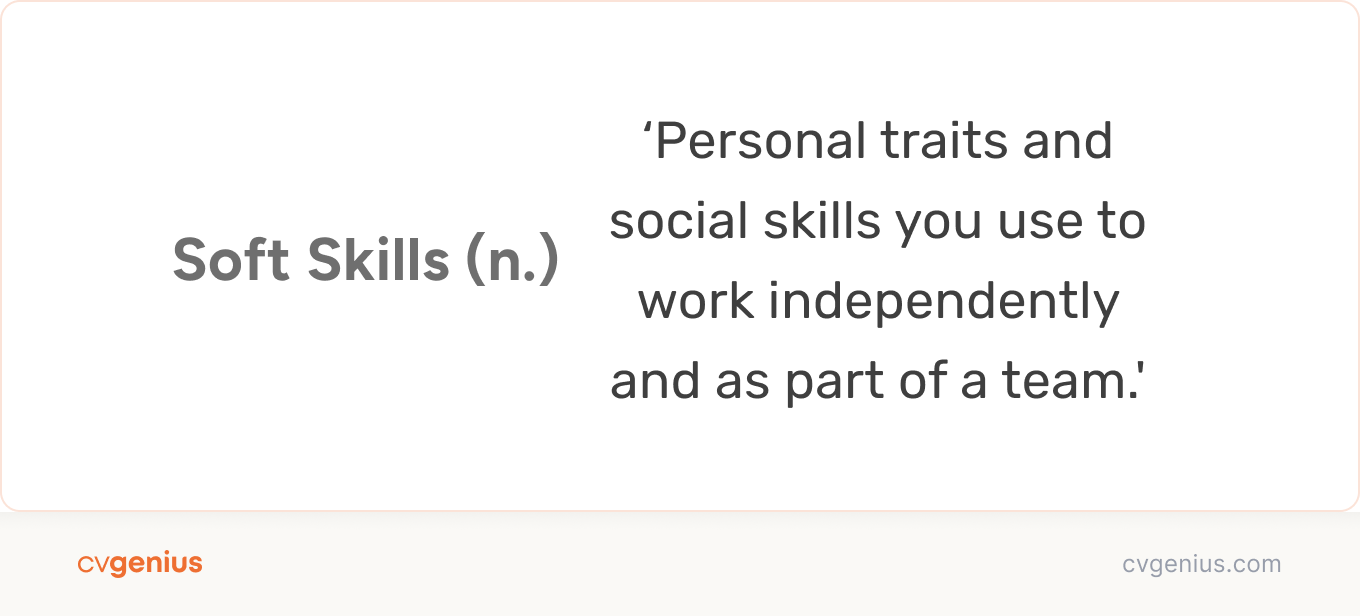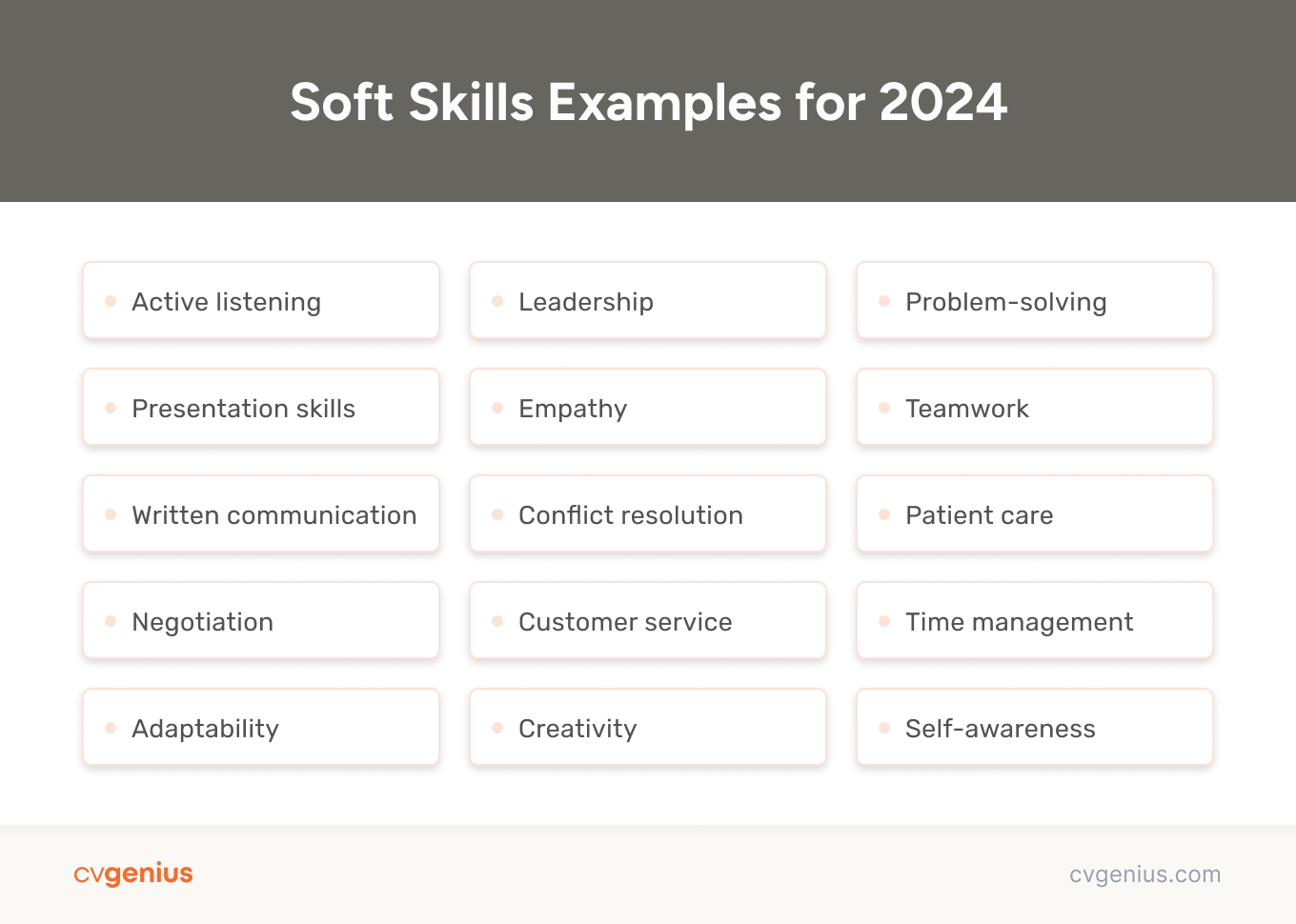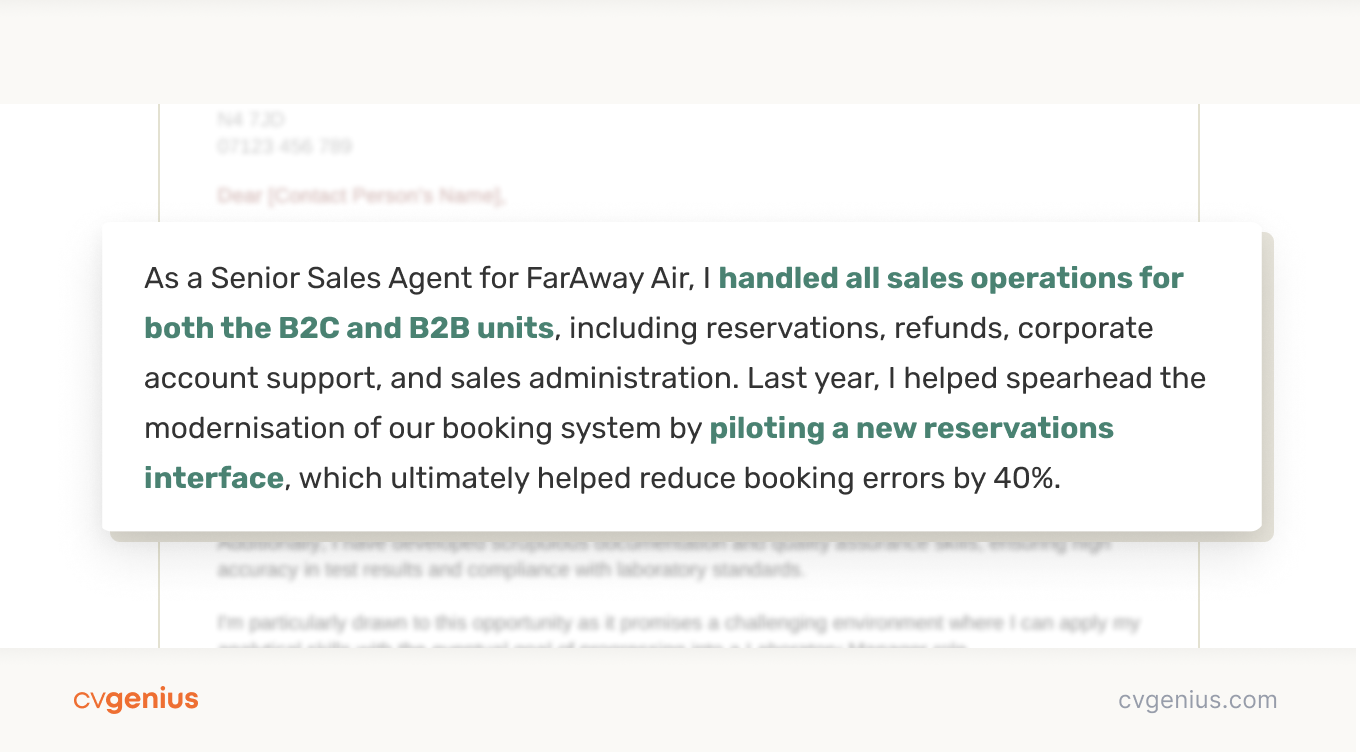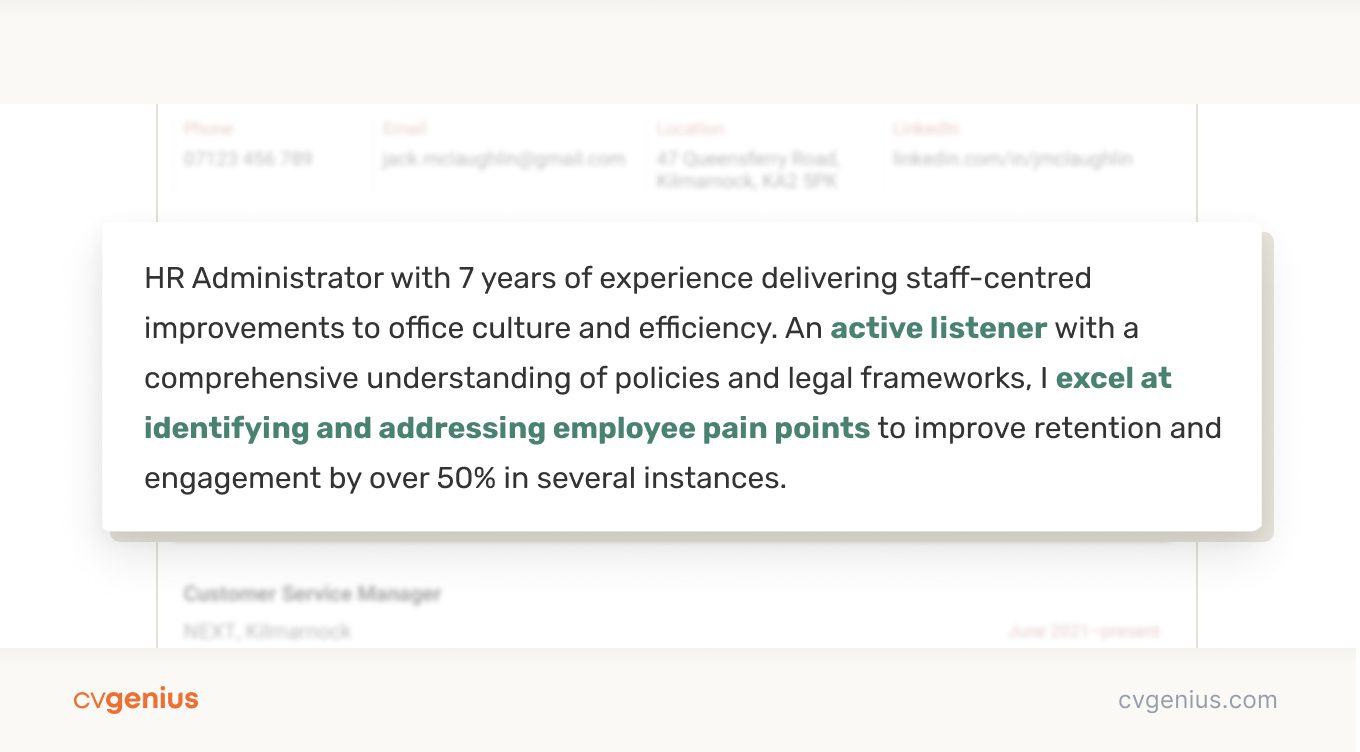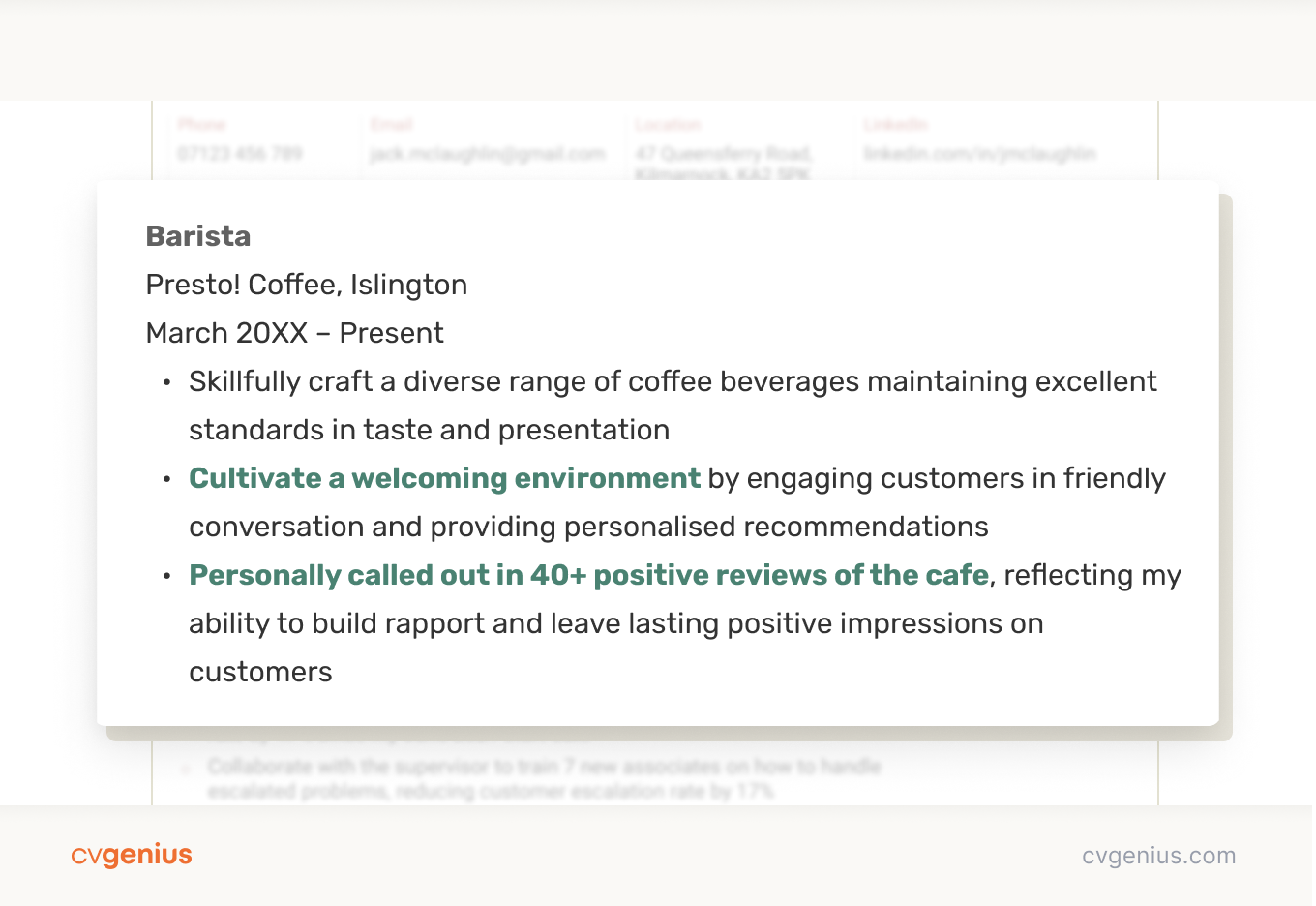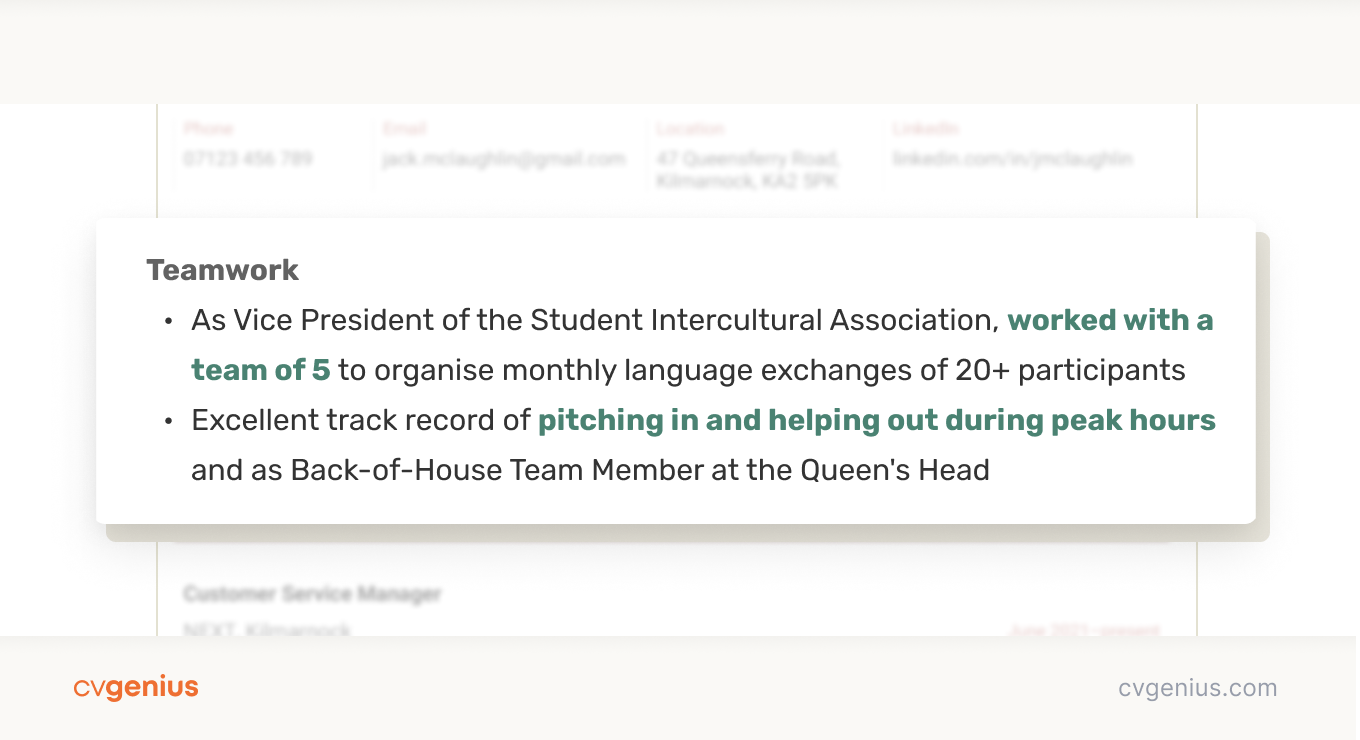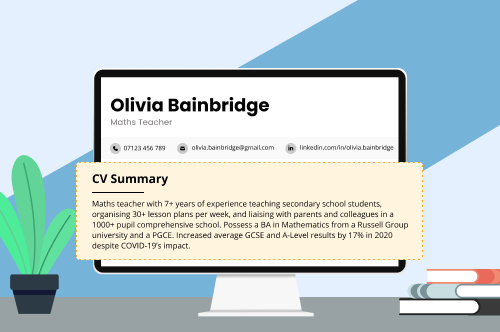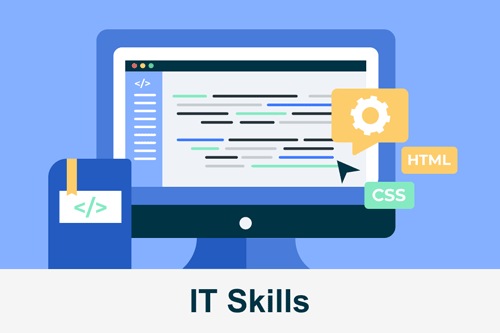If you’re looking for a job in 2024, you’ll notice every employer is looking for two things in their next hire:
- Technical knowledge for doing specific tasks
- Personal traits for performing well in the role
These personal traits, qualities like good communication and empathy, are commonly known as soft skills — and knowing how to talk about them on your CV is essential for standing out when you apply for a job.
Soft skills definition
Soft skills are personal traits and social skills you use to work independently and as part of a team.
Unlike hard skills, which are occupational abilities or knowledge that you learn through training, soft skills are character traits that you develop through life experiences. On a CV, hard skills tell employers what you can do, while soft skills tell them how you do that work.
For example, knowing how to teach maths is a hard skill, and leadership is a soft skill — but you need both to be a good maths teacher.
Because the term ‘soft skills’ includes all the personal and social skills that you use at work, it means different things to different employers. Therefore, whenever you apply for a job, identify which soft skills the employer is looking for and highlight them effectively on your CV.
15 soft skills examples for your CV
To help you emphasise the right soft skills for your next job application, we’ve put together a list of 15 high-demand soft skills employers are looking for in 2024.
- Active listening
- Presentation skills
- Written communication
- Negotiation
- Adaptability
- Leadership
- Empathy
- Conflict resolution
- Customer service
- Creativity
- Problem-solving
- Teamwork
- Patient care
- Time management
- Self-awareness
1. Active listening
Active listening is essential in any team environment or customer-facing position. This widely prized soft skill is the practice of attentively listening, showing whether you understand, and responding with thoughtful feedback.
Demonstrating active listening during the job application process helps reassure the employer that you’ll contribute positively to their team if hired.
To demonstrate active listening skills on your CV, include specific examples or relevant metrics (e.g., ‘customer satisfaction’).
2. Presentation skills
Employers seek individuals who can convey information clearly and engagingly, particularly for outward-facing jobs like sales, marketing, and public policy.
Here are a few examples of CV achievements that demonstrate strong presentation skills:
- Public speaking engagements
- Investor pitches
- Media interviews
- Successful client proposals
3. Written communication
Good written communication skills help you explain your ideas clearly and professionally. Being an excellent communicator is a valuable soft skill in any work environment because it allows you to:
- exchange information quickly and accurately with others
- avoid misunderstandings or potential conflicts with coworkers
- maintain positive relationships with your customers or colleagues
A well-written cover letter is one of the most effective ways to demonstrate strong written communication. Improve yours by writing clearly and concisely with captivating CV language.
4. Negotiation
Valued in virtually every role, strong negotiators use patience and problem solving skills to resolve differences and achieve mutually beneficial outcomes.
Example of negotiation skills in action
A customer contacts a telecommunications company to cancel a service due to an error. The customer service representative listens to the customer’s concerns, but instead of immediately processing the cancellation, offers the customer compensation in exchange for retaining their subscription.
5. Adaptability
Adaptability is the ability to adjust to new situations and succeed in them.
In some occupations, adaptability is essential for handling diverse responsibilities. For example, a Content Manager who oversees PR communications, social media strategy, and website copy has to use a different writing style and strategy for each of these focuses.
However, this soft skill is also a key part of creativity and innovation. Adaptable employees actively review how they work and experiment with new tech and procedures, making it easier for their team to respond quickly to obstacles and opportunities.
Demonstrate adaptability by including specific examples when you make your cover letter:
6. Leadership skills
Great leadership skills involve understanding people’s motivations and guiding them towards a specific goal. Being a good role model is essential, as is the ability to prioritise organisational needs and develop clear processes that’ll allow your team to address them.
A few professional experiences that indicate strong leadership include:
- onboarding and training new employees
- self-starting to resolve a company problem
- developing or overseeing company strategy
7. Empathy
Empathy refers to your ability to understand and relate to other people.
In addition to contributing to positive, productive relationships, empathy brings several benefits to professional spaces, including:
- enhancing teamwork
- improving leadership
- increasing employee engagement
- enhancing customer service
- contributing to supportive, sustainable company cultures
- better approaches to task delegation and work distribution
You convey empathy by example, so make sure your CV includes achievements, strengths, or responsibilities that reflect your ability to understand others and work in their interests:
8. Conflict resolution
Conflict resolution is the ability to address and resolve disagreements to the satisfaction of everyone involved. Employers highly value this skill because it promotes a positive work environment, enhances engagement and teamwork, and ultimately contributes to the overall success of the business.
Both your cover letter and the job interview are great places to demonstrate masterful conflict resolution skills. Use the STAR method to give context and show how your actions improved team morale.
9. Customer service
No, they’re not just necessary in customer support and sales. You’ll needcustomer service skills in any client-facing job — which in the UK is most of them.
Employers want to know you’re someone who can see the customer at every stage of company processes and will leave them feeling happy with your services whenever you interact with them directly. Here’s a CV example that clearly highlights strong customer service skills:
10. Creativity
Finding creative solutions to problems is essential in most jobs because it shows you can handle whatever problems arise. Creativity also refers to the ability to create unique work, which is essential for jobs such as teaching,journalism, copywriting, and graphic design.
A unique way to emphasise creativity is by including a varied hobbies and interests section on the second page of your CV.
11. Problem-solving
Employers value employees who independently anticipate and address problems rather than idly waiting for them to disappear.
The ability to identify problem areas, develop solutions, and implement those solutions is highly sought after, so ensure employers know you can handle challenges in your target role.
12. Teamwork
Teamwork skills allow you to collaborate effectively and build strong relationships with your peers.
A good team player is someone who knows how to be respectful, motivate others, and contribute to making meaningful decisions that help everyone reach their goals.
This entry from a skills-based CV gives a few examples that reflect the applicant’s effectiveness working in a team:
13. Patient care
Also known as bedside manner, patient care skills are social skills that enable doctors, nurses, and other medical practitioners to build trusting, supportive relationships with patients. These soft skills should show you can build rapport with patients, understand their needs, and make them feel cared for — and they’re essential on any medical CV or care CV.
14. Time management skills
Time management is the process of organising your time efficiently by setting goals, prioritising tasks, and allocating time effectively. Proficient time managers ensure that important tasks are completed on schedule and to a satisfactory standard.
In addition to being a great asset for a team, time management is great for individual engagement, as avoiding procrastination reduces the likelihood of feeling overwhelmed and burnt out at work.
15. Self-awareness
While empathy and conflict resolution help you address the problems of your colleagues and customers, self-awareness is about understanding your own emotions and actions — and the impact of both on those around you.
An employee with a highly developed sense of self-awareness will be a valued addition to any team as they work effectively within their capabilities, seek help when needed, and contribute positively to the team. Individuals with this trait are also often more adaptable, resilient, and open to feedback, making them likely to develop quickly within the company that hires them.
Frequently asked questions about soft skills
Here are answers to some of the most commonly asked questions about soft skills:
- What are some good soft skills for managers?
- How can I improve my soft skills?
- Does including soft skills on your CV make you appear big-headed?
1. What are some good soft skills for managers?
Some good soft skills for managers are leadership, communication, making decisions, empathy, and solving problems in the workplace.
These skills are essential for anyone in management because they allow managers to:
- motivate their employees
- give workers clearly defined directions
- understand each employee’s point of view
- delegate tasks efficiently
- prevent issues among staff
2. How can I improve my soft skills?
You can improve your soft skills by learning to understand yourself, selecting specific soft skills to work on, and setting achievable goals.
First, understanding yourself is key so you can get a better idea of who you are and what you need to work on. Try asking yourself questions such as:
- ‘What soft skills do I already have?’
- ‘What soft skills are relevant for the job I want?’
- ‘What soft skills should I work on improving?’
After you’ve identified one or two soft skills you want to improve, try setting SMART goals (which stands for Specific, Measurable, Achievable, Realistic, and Time-bound) goals to help you:
- take actionable steps towards improving your abilities
- stay accountable with your goals
- feel a sense of achievement once you’ve successfully handled an interaction involving your soft skills
Try asking someone you trust to note whenever you’ve made improvements to better understand what you did well and what you can still work on.
3. Does including soft skills on your CV make you appear big-headed?
No, it’s not big-headed to include soft skills on a CV. As an overview of your relevant skills and professional experience, your CV should highlight any social skills or personal traits that make you a good fit for the position.
However, you should avoid describing your soft skills in overconfident or braggy language. If you introduce yourself as an ‘unparalleled Sales Advisor able to negotiate a win in any situation,’ you’re unlikely to make a professional (or even likeable!) first impression.
Instead, illustrate your soft skills by giving specific examples that are relevant to the job you’re applying for:
Experienced Sales Advisor with an excellent track record negotiating favourable bulk purchases and maintaining a client retention rate of over 90%.
More FAQs related to soft skills on your CV
Below are more questions to assist you with the CV writing process.

